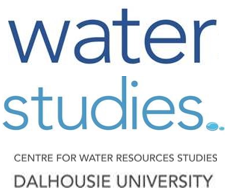
About Centre for Water Resources Studies:
The Centre for Water Resources Studies was established in 1981 by the Faculty of Engineering to address water issues facing Atlantic Canada through applied research. Continuing this tradition, the objective of the centre is to pool the research resources of Dalhousie University to address real challenges faced by the water community and provide a platform for the development and appropriate application of water technology; water quality analysis and advancement; and outreach through knowledge transfer to our stakeholders.
The Centre has provided technical support to many government agencies, municipalities and private sector end-users in the water sector. The Centre has delivered value to its partners through technical research projects, analytical laboratory support and training workshops. See our highlighted research projects organized by theme: Drinking Water, Wastewater, Watersheds and Geo-Environmental.
The current Water Studies team engages faculty members from across Dalhousie University and retains a core staff of personnel (e.g., Research Engineers, Analytical Chemists, Field Research Technicians) that enables professional project deployment and management. We are always recruiting motivated Masters and PhD students.
Thanks to Water Studies for being a Silver Sponsor of the ACWWA 2021 Annual Conference!
Thanks to Water Studies for being a Silver Sponsor of the ACWWA 2020 Annual Conference!
2021 Technical Presentations from Water Studies, Dalhousie University:
Abstract: Wastewater Surveillance Of Sars-Cov-2 In Nova Scotia
Day 2: December 8, 2021 at 12:07 PM
Crystal L. Sweeney1, Emalie K. Hayes1, Genevieve B. Erjavec1, Madison T. Gouthro1, Bofu Li1, Anna L. Parra1, Lindsay E. Anderson1, Jessica L. Bennett1, Wendy H. Krkosek2, Amina K. Stoddart1, and Graham A. Gagnon1.
1Centre for Water Resources Studies, Faculty of Engineering, Dalhousie University, Halifax, NS, Canada
2Halifax Water, 450 Cowie Hill Road, Halifax, Nova Scotia, Canada B3P 2V3
Although COVID-19 is considered a respiratory illness, the genetic material of SARS-CoV-2 has been found in the feces of infected individuals. As a result of this viral shedding, wastewater analysis of SARS-CoV-2 can determine the presence of the virus in a contributing population. The viral signal can also be detected before symptoms develop (i.e., prior to a positive clinical test result) and in asymptomatic carriers. As such, wastewater surveillance of SARS-COV-2 in areas of low COVID-19 prevalence may provide an early warning system for the reoccurrence of the virus. Following the development of rapid and effective methods for detecting SARS-CoV-2 in wastewater and primary solids, we implemented a province-wide wastewater surveillance program with over 30 sampling sites across Nova Scotia. Through our sentinel monitoring program, we identified an early warning signal in wastewater approximately 2.5 weeks in advance of the province’s third COVID-19 wave and a persistent viral signal in wastewater during the rise in cases. Through passive sampling in our targeted monitoring program, we observed the appearance, disappearance, and reappearance of the viral signal at a targeted site at the onset of the third wave and persistent viral signals at other targeted locations. Our community-based program is an adaptive approach that allows us to expand this wastewater surveillance of SARS-CoV-2 research program to other municipalities in Nova Scotia. Overall, this project will have a significant impact on the lives of Nova Scotians as it has the potential to provide early detection of COVID-19 infections in our province’s communities.
About Crystal Sweeney, Postdoctoral Researcher:
Crystal Sweeney is a postdoctoral fellow at the Centre for Water Resources Studies at Dalhousie University. In 2019, she completed an Interdisciplinary PhD Program at Dalhousie University. Her doctoral work involved the development of analytical methods for measuring pesticide biomarkers in serum and urine using liquid chromatography-tandem mass spectrometry. In her current role at the CWRS, Crystal is the project manager for a study on the Wastewater Surveillance of SARS-CoV-2 in Nova Scotia.
Abstract: Bench-Scale Daf Polymer Optimization Study To Improve Effluent Quality At A Municipal WWTF
Day 3: December 9, 2021 at 11:40 AM AT
A treatment facility in Atlantic Canada currently utilizes moving bed biofilm reactors (MBBRs) as well as dissolved air flotation (DAF) with polymer to treat municipal wastewater. Although the facility is meeting current provincial regulations, the aesthetic of the effluent is impacted by
potential issues with solids loading and excess polymer content, and there are concerns that high salinity in the influent is impacting process performance. Accordingly, the objective of this work was to conduct bench-scale jar testing experiments to optimize polymer dose under various water
quality conditions with a goal of improving overall DAF performance.
Through jar testing, optimization measures (such as polymer dose) were conducted to help remedy the issues and ensure efficient treatment of wastewater in the DAF system. Bench-scale testing was used to determine optimum polymer dose, pH, and recycle rate depending on influent
characteristics such as conductivity and total suspended solids (TSS). The effectiveness of polymer during high influent salinity was also assessed.
Preliminary results suggested that under a variety of influent TSS conditions evaluated (ranging between ~60 to >100 mg/L), a lower polymer dose could be considered. Further, jar testing revealed that under high salinity conditions in the influent, a noticeable impact on polymer
performance was observed and higher polymer doses may be required to remove TSS these conditions. It is anticipated that these dosages and conditions will be evaluated under a pilot or full-scale scenario, which will allow a further investigation of the conditions identified as optimal at bench-scale, under dynamic flow and water quality conditions.
About Sheila Fyfe:
Sheila Fyfe has a degree in environmental engineering from Carleton University, Ottawa. She is currently a graduate student at Dalhousie University with the Centre for Water Resources Studies (CWRS) focusing on the optimization of a wastewater treatment plant in Atlantic Canada.
.
.
2020 Technical Presentations from Water Studies, Dalhousie University:
Abstract: Corrosion Control In Distribution Systems: Evaluating Your Options
Day 1: December 8, 2020 at 12:05 PM AT
Blended phosphates are widely used for simultaneous corrosion control, anti-scaling, and metals sequestration but very limited information on their interactions with lead and iron in drinking water systems is available. This presentation will summarize our recent experimental work exploring current and alternative corrosion control methods. We examined the impact of orthophosphate, polyphosphate, and ortho-polyphosphate blends on lead release, and we compared them to alternatives: sodium silicates and orthophosphate-silicate blends.

About Javier Locsin:
Javier Locsin’s background spans the fields of manufacturing, power and water engineering. His specific interest is in drinking water distribution corrosion control using phosphate based inhibitors. A graduate of De La Salle University-Manila and Dalhousie University with degrees in mechanical and civil engineering respectively, he is currently pursuing a PhD degree in water resource engineering at Dalhousie University.
Abstract: Investigation of the Effects of Phoslock® Application On Drinking Water Treatment In Atlantic Canada
Day 3: December 10, 2020 at 9:40 AM AT
Isobel DeMont1, Crystal Sweeney1, Dallys Serracin-Pitti1, Amina Stoddart1, Graham Gagnon1
1Centre for Water Resources Studies, Dalhousie University
Phoslock ®, a Lanthanum (La) modified bentonite clay, has been applied in surface waters globally for control of harmful algae blooms. Phoslock® binds to soluble reactive phosphorous (P) and limits the availability of the nutrient to primary producers. Past work has demonstrated release of La from Phoslock® upon source water application, and the impacts of this release within the water body has been presented in literature. However, little consideration has been given to the effects of Phoslock® application on downstream processes, such as drinking water treatment. Therefore, we began conducting jar tests on La-spiked raw water to determine the influence of La on removal of organic matter in coagulation/flocculation. Further, oxidant demand tests were conducted with chlorine and potassium permanganate to determine the impact of La on additional drinking water treatment processes.

About Isobel Demont:
Isobel DeMont is a PhD student in Civil Engineering at Dalhousie University. Isobel received a Bachelor’s Degree in Mechanical Engineering from McGill University in 2018, and recently graduated from Dalhousie with a Masters of Applied Science. Her MASc research focused on the coagulation/flocculation of source water undergoing lake recovery from acidification. Continuing under the supervision of Dr. Graham Gagnon and Dr. Amina Stoddart, Isobel’s doctoral research will focus on advanced processes in drinking water treatment, specifically the degradation of natural organic matter.


